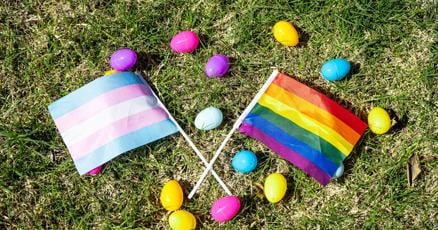
While Easter eggs were being hunted, transgender rights were being argued online.
Partisan tensions were raised on social media after President Joe Biden released a proclamation honoring Transgender Day of Visibility on March 31.
The same day as Easter.
Oklahoma Gov. Kevin Stitt, as well as other conservative politicians, took to social media to voice their disapproval.
“The White House is trying to erase Easter,” Stitt said in a post on X, formerly Twitter. “It should be a day to celebrate Jesus’ resurrection. To replace it with a politically charged awareness day is disappointing. As for me and my state, we will serve the Lord!”
Many social media posts contained misinformation, leading viewers to believe Biden declared the day a celebration this year. However, Transgender Day of Visibility has been celebrated since 2009. It always falls on March 31.
Easter, however, does not. The Christian holiday fluctuates dates each year according to the church’s calendar.
OSU Queer and Allies president Sam Barrie said the controversy was sparked because it dealt with LGBTQ+ rights.
“People weren’t upset when Easter was on April Fool’s Day last year,” Barrie said. “So I find it a similar issue.”
The controversy comes as the latest display of nation-wide political partisanship. The Democratic and Republican parties are gearing up for a contentious rematch between Biden and Donald Trump in November.
Political science professor Seth McKee said small spats, such as this, are commonplace in today’s political landscape.
“That doesn’t come as a shock to anybody, unless they’re living under a rock,” McKee said. “I don’t see anything in terms of this doing anything that moves the needle. Because it’s as expected. There’s no American voter that looks at this little spat and thinks, ‘Oh, that’s unusual.’ No, it’s par for the course.”
Politicians have used social media platforms, such as X, to share information, opinions and keep their constituents up to date. New arguments pop up frequently and fluctuate with the news cycle.
In Oklahoma, voter demographics show a prominent Republican constituency. Trump won all 77 Oklahoma counties in the 2016 and 2020 presidential elections.
Oklahoma, which has a prominent rural presence, is full of voters who subscribe to traditional values, McKee said.
“One way to think about this is that the culture war trenches have been dug in deep, and they’ve been there for, gosh, I’d say a generation now,” McKee said.
This can make political conversations tough.
Avery McIntyre, vice president of the College Democrats of OSU, said she has found social media to be a catalyst for partisanship.
“If you’re posting about it on social media all the time, you’re contributing to the echo chamber,” McIntyre said. “And it’s the same thing that you get frustrated at because you see other people just posting about it and not doing anything.”
Particularly in an election year, McIntyre said it is important for voters to not put their full trust in social media and to recognize bias in the information they receive.
She said finding space for political discourse, particularly on a college campus, can be beneficial. Joining organizations where students can practice activism can be a step toward breaking down the staunch partisanship.
OSU’s College Republicans did not respond to request for comment.
Still, this can be a dangerous issue for transgender Americans. They experience high levels of violence, and half of transgender youth have considered suicide in the past year, according to Biden’s proclamation.
“We’re not trying to aggravate people, we’re just trying to exist,” Barrie said.
Balancing identity with politics and safety can be difficult.
For Barrie, Transgender Day of Visibility is an opportunity to proudly display his identity. The weekend’s controversy serves as a reminder for voters to keep alternative perspectives in mind, Barrie said.
Social media, and the political information shared on its platforms, can make it seem as if fighting is the only way of expression.
“It’s when everyone is trying to yell at everyone else, it’s hard to hear the people who are saying, ‘Maybe we shouldn’t be yelling at each other,’” Barrie said.



